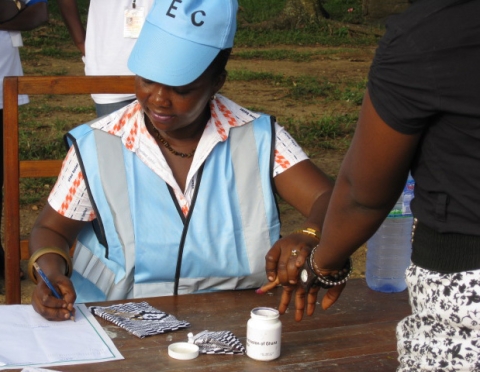
A new website is helping Ghana's citizens find their nearest voter registration center, so that they can be sure they are eligible to vote in the 2016 general election.
GotToVote!, which is optimized for mobile devices, explains who is eligible to register for the 2016 general elections in Ghana and gives a simple overview of the voter registration process. It tells users what documentation to take with them to register and helps them find their nearest voter registration center.
Much of this information is available elsewhere, but is “a miss-mash of PDFs, MS Word or MS Excel documents, along with CSVs ... [from a] variety of different ministry or other official websites,” according to a statement on the GotToVote! Ghana website. Because voting registration is delegated to districts in Ghana, there is no single, national standard for who is an eligible voter.
The site is the latest iteration of the GotToVote! model that’s been used successfully since 2013 in the lead-up to elections in Kenya, Malawi and Zimbabwe.
The first GotToVote! site was built at virtually zero cost as a Code for Kenya data journalism experiment ahead of Kenya's 2013 general election. It was built in response to the fact that Kenyan citizens were struggling to find the locations of their polling stations.
Code for Kenya was a pilot program funded by the Africa Media Initiative (AMI) and the African News Innovation Challenge (ANIC). ANIC and Code for Kenya are part of media innovator Justin Arenstein's ICFJ Knight International Journalism Fellowship. Code for Kenya embedded four Data Fellows into major Kenyan newsrooms and a civil society organization for five months to help kickstart experimentation with data-driven civic engagement tools. Its success sparked the launch of Code for South Africa in early 2014, and now the new Code for Ghana and Code for Nigeria initiatives.
In partnership with Code for Ghana, GotToVote! Ghana was built in just two days by grassroots social justice watchdog organization Odekro and the continental open data and open government incubator, Code for Africa. The partners are now campaigning to get potential voters in Ghana to use the site.
To help people find the website, the online campaign is using the #GotToVote hashtag on Twitter and Facebook.
Future versions of the site will introduce SMS tools, and will help users verify their registration, find their balloting stations and track their local election results.
All the cleaned-up data and source materials used to power the GotToVote! Ghana website are available, free-of-charge, for reuse.
According to the site: “Code for Africa and its partners hate seeing civil society or anyone else being duped into wasting money unnecessarily on inappropriate technology or predatory consultancies.”
CC-Licensed photo from Ghana's 2008 elections courtesy of the BBC World Service on Flickr.
Global media innovation content related to the projects and partners of the Knight Fellowships on IJNet is supported by the John S. and James L. Knight Foundation and edited by Jennifer Dorroh. ICFJ produces IJNet in seven languages: Arabic, Chinese, English, Persian, Portuguese, Russian and Spanish.